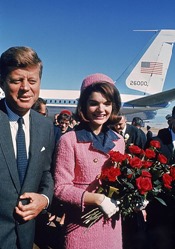When JFK Died, Things Changed
 Where were you when JFK died? On November 22, 1963, President John F. Kennedy was assassinated in Dallas, Texas. It is amazing how my memory awakens concerning that season in American life. When JFK died…
Where were you when JFK died? On November 22, 1963, President John F. Kennedy was assassinated in Dallas, Texas. It is amazing how my memory awakens concerning that season in American life. When JFK died…
I was in the second grade
I had just turned eight years old and was in the second grade when we were informed of the assassination of President Kennedy. Television captivated those moments before our eyes. For days, until the President was buried, it seemed America came to a complete stop. I remember watching our black and white television non-stop – or as much as the event could be covered.
My generation was shaped
Just as my children’s generation has been shaped by the events of September 11, 2001, my generation was shaped by the stunning death of our President in 1963. Looking back, it still seems surreal. Can you believe it? Our President was shot to death on the streets of the great city of Dallas, Texas.
Journalist Peggy Noonan writes in the Wall Street Journal article “Why We Still Talk About JFK”:
We still talk about JFK and his death because the biggest generation in all U.S. History, that part of the population known as the baby boomers, watched it all, live, on that new thing called TV, and it entered our heads and never left. It was the first central historical fact of our lives, so we still read about it, think about it, and watch anything to do with it.
Yes, my generation was shaped by the death of this President. I am still captivated and continue to read about it to this day.
A new future was forged
Through the fire of this tragic loss in American history, a new future began to be forged with the heat of subsequent assassinations, cultural tension in America, racial inequality, and the Vietnam War. Mindsets and ideologies began to change and diversify, causing even more tension in American life.
In the same Wall Street Journal article, Peggy Noonan made a keen observation:
But Camelot isn’t JFK. Camelot is the way we remember America before JFK died. Camelot is the America that existed, for one brief shining moment, before Lee Harvey Oswald began to shoot.
Perhaps my generation and those who came before us are guilty of wanting an America that was existent before the open bloodshed on the streets of Dallas on November 22, 1963.
Life’s tragic moments
Life’s tragic moments that happen to us personally and in our nation do not necessarily have to define us. Often times, they really just expose us. They reach into the depths of our hearts, into the inner sanctum of our being, and squeeze us. At that moment, what is in us comes out.
The way we respond to these tragic moments serves as a reminder of our human weakness and our deep need for God. Whether I am looking back at the events I experienced as an eight year-old in the second grade or as an adult Pastor-Leader in 2001 when 9-11 attacks occurred, I am reminded of the weakness of our humanity and our deep need for God.
Wherever you are today
Wherever you are today in your life, go ahead and admit your weakness as a human being and acknowledge your deep need for God. Often, we act as though nothing can penetrate our callousness, but tragedy always exposes where we really are in life.
Wherever you are and whatever may be before you this week, remember your deep need for God. He is there. He is with you. Yes, He is Emmanuel. God is with us.
Yours for the Great Commission,
Ronnie W. Floyd


